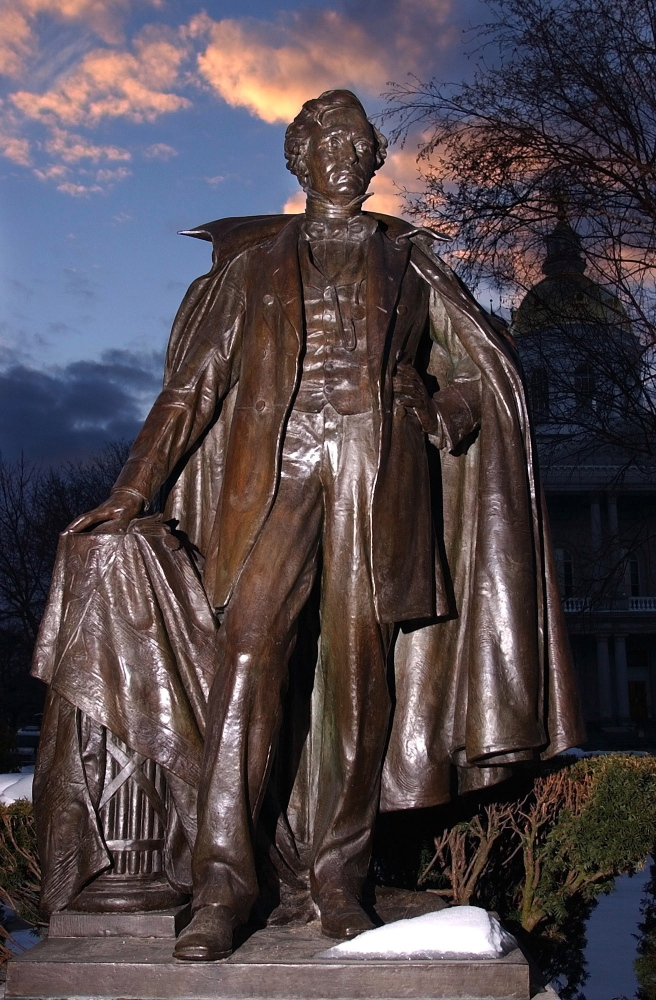CONCORD, N.H. — When it comes to presidents, New Hampshire is much better at picking them than producing them.
The 14th president, Franklin Pierce, was a New Hampshire native, serving in the 1850s. But no one has come close in the 100 years since the state began holding statewide presidential primary elections. And that just might be the price New Hampshire pays for keeping its prime spot on the nominating calendar.
“It may be the byproduct of having the honor of being first – not having (a president) of our own,” said longtime Republican operative Tom Rath. “I don’t know if it means we never will, but it really does limit them right now.”
Some worry that if the state did field a serious contender, other candidates would bypass New Hampshire’s first-in-the-nation primary. It’s not an irrational fear: In 1992, some major Democratic candidates skipped the Iowa caucuses because Sen. Tom Harkin was running. In another early voting state, South Carolina Sen. Lindsey Graham’s current candidacy has some Republican leaders concerned that his home state advantage will hurt the state’s significance in 2016, although none of the top-tier candidates have shied away so far.
Although New Hampshire has held the nation’s earliest presidential primary every cycle since 1920, it has faced frequent, ultimately unsuccessful challenges from other states hoping to steal some of the spotlight.
“People would tend to say, ‘If you skip it once, you can skip it again,’ ” Rath said. “Given the fierceness with which we’ve defended the primary against enemies in the last several cycles … if anything diminishes the primary as a legitimate test, it’s like diminishing our most significant political possession.”
The primary pinnacle for New Hampshire’s native sons may have been 1920, when delegates backing Winchester native Leonard Wood’s candidacy won the Republican contest. Wood, the commanding officer of Theodore Roosevelt’s “Rough Riders” during the Spanish-American War, was viewed by many as Roosevelt’s political heir, but he lost the nomination to Warren G. Harding.
For the first nine primaries, voters did not directly vote for presidential candidates. Instead, they selected national convention delegates whose preferred candidates were not always noted. That makes it difficult to determine whether other New Hampshire residents followed in Wood’s footsteps before 1952, when candidate names were added.
Since then, 19 residents of New Hampshire have appeared on the ballot out of nearly 300 candidates, according to an Associated Press review of sample ballots and election results. The 18 men and one woman – some ran more than once – amassed a combined total of roughly 6,000 votes. The lone woman, Dorian Yeager of Rye, got 98 votes in the 2000 Republican primary.
The top vote-getter was former Berlin Mayor Dick Bosa, whose 841 votes in the 2004 Republican primary was nearly quadruple what he garnered in 1996. In 2004, he finished second only to George W. Bush among the Republicans on the ballot, although five Democrats got more write-in votes.
The most successful Democrat was Carmen Chimento of Brookline, who came in eighth place in the 1996 Democratic primary with 656 votes. Some Republicans got more write-in votes, but he placed third among the more than 20 Democrats, behind President Bill Clinton and comedian Pat Paulsen.
“I wasn’t a slouch by any stretch of the imagination,” Chimento, now 85, told The Associated Press. A theologian and author who formerly worked as a software engineering writer, he ran to raise awareness about the failures of Social Security, which he likened to a Ponzi scheme.
Although New Hampshire’s extremely large, 424-member citizen Legislature provides an easy entry into politics, those who use it as a stepping stone to higher office tend to stop at the governorship or Congress. One exception was former U.S. Sen. Bob Smith, although his brief 2000 presidential campaign ended before he got on the ballot.
The state tends to produce strategists and policy wonks rather than politicians with national profiles, Rath said. And the state’s two-year term for governor, which results in near-continuous campaign cycles, hampers presidential ambitions, he believes.
That leaves a varied collection of lesser-known New Hampshire residents to round out the ballots. It costs just $1,000 to get on, a small price for a shot at some of the media attention that surrounds major candidates.
“I think a lot of them just want to take a picture of the ballot, leave it to their families and say, ‘Gee, I ran for president,’ ” Rath said. “It’s less trouble than getting a vanity license plate.”
A cool vanity plate might be more useful. Chimento joked that he tells relatives to mention his name and presidential candidacy if they ever get stopped by police. His nephew tried it once.
The officer responded: “Who?”
Send questions/comments to the editors.



Success. Please wait for the page to reload. If the page does not reload within 5 seconds, please refresh the page.
Enter your email and password to access comments.
Hi, to comment on stories you must . This profile is in addition to your subscription and website login.
Already have a commenting profile? .
Invalid username/password.
Please check your email to confirm and complete your registration.
Only subscribers are eligible to post comments. Please subscribe or login first for digital access. Here’s why.
Use the form below to reset your password. When you've submitted your account email, we will send an email with a reset code.